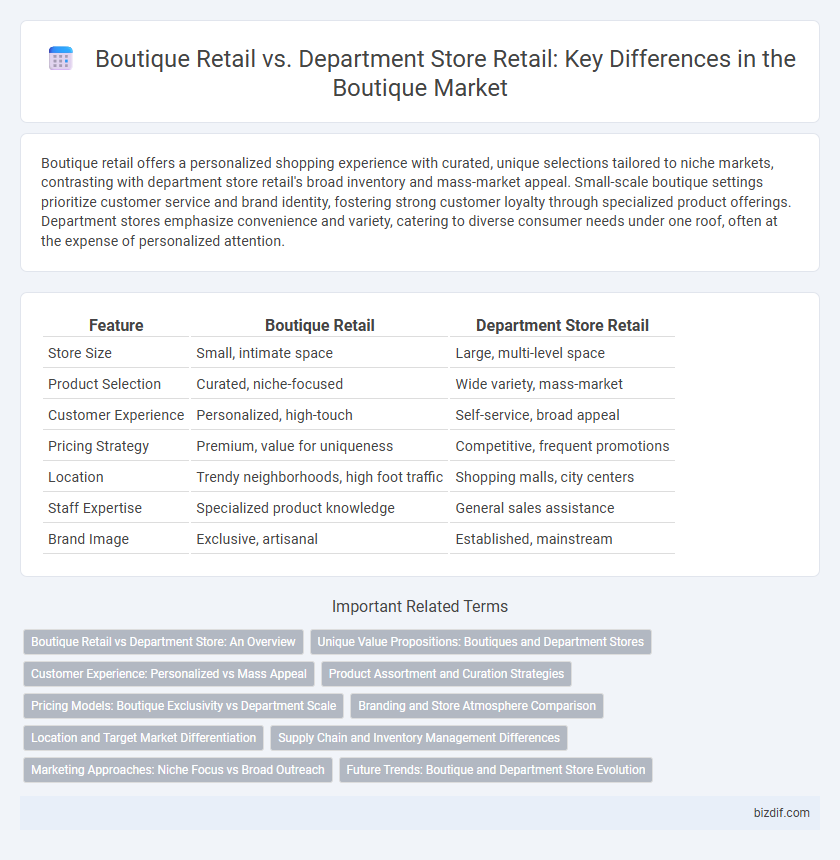Boutique retail offers a personalized shopping experience with curated, unique selections tailored to niche markets, contrasting with department store retail's broad inventory and mass-market appeal. Small-scale boutique settings prioritize customer service and brand identity, fostering strong customer loyalty through specialized product offerings. Department stores emphasize convenience and variety, catering to diverse consumer needs under one roof, often at the expense of personalized attention.
Table of Comparison
| Feature | Boutique Retail | Department Store Retail |
|---|---|---|
| Store Size | Small, intimate space | Large, multi-level space |
| Product Selection | Curated, niche-focused | Wide variety, mass-market |
| Customer Experience | Personalized, high-touch | Self-service, broad appeal |
| Pricing Strategy | Premium, value for uniqueness | Competitive, frequent promotions |
| Location | Trendy neighborhoods, high foot traffic | Shopping malls, city centers |
| Staff Expertise | Specialized product knowledge | General sales assistance |
| Brand Image | Exclusive, artisanal | Established, mainstream |
Boutique Retail vs Department Store: An Overview
Boutique retail offers a personalized shopping experience with curated product selections and exclusive brands, distinguishing itself from department store retail that provides a wide variety of goods under one roof. Boutiques typically emphasize unique, high-quality merchandise and in-depth customer interaction, whereas department stores focus on convenience, volume, and diverse categories ranging from apparel to home goods. This differentiation allows boutiques to target niche markets and foster customer loyalty through specialized service and distinct ambiance, contrasting with the broader appeal and often standardized shopping environment of department stores.
Unique Value Propositions: Boutiques and Department Stores
Boutique retail offers personalized customer experiences and distinct product selections, emphasizing exclusivity and niche markets that attract clientele seeking unique, high-quality items. Department stores provide a broad assortment of brands and categories under one roof, appealing to convenience-oriented shoppers with competitive pricing and promotional events. The unique value proposition of boutiques lies in curated merchandise and intimate service, while department stores leverage scale, variety, and accessibility.
Customer Experience: Personalized vs Mass Appeal
Boutique retail focuses on delivering a personalized customer experience by offering tailored product selections and attentive service that caters to individual preferences. Department store retail emphasizes mass appeal, presenting a wide variety of brands and products to attract a broad customer base but with less individualized attention. The boutique environment fosters deeper customer loyalty through unique, curated interactions, while department stores prioritize convenience and extensive choice.
Product Assortment and Curation Strategies
Boutique retail emphasizes a highly curated, niche product assortment tailored to specific customer preferences, often featuring unique or limited-edition items that foster exclusivity and brand identity. Department store retail offers a broad, diverse product range across multiple categories, prioritizing variety and accessibility to appeal to a wide customer base. Boutiques invest heavily in personalized curation strategies, leveraging deep customer insights to select products that align closely with lifestyle trends and local demand.
Pricing Models: Boutique Exclusivity vs Department Scale
Boutique retail pricing models often focus on exclusivity, leveraging limited product quantities and unique designs to justify premium prices. Department store retail employs scale-driven pricing strategies, capitalizing on high-volume sales and bulk purchasing power to offer competitive, lower prices. This contrast highlights boutiques' emphasis on personalized, high-value experiences versus department stores' broad accessibility and affordability.
Branding and Store Atmosphere Comparison
Boutique retail emphasizes unique, curated product selections that reinforce a strong, personalized brand identity, creating an exclusive shopping experience that contrasts sharply with department stores' broader, mass-market appeal. Store atmosphere in boutiques is often intimate and themed, designed to evoke emotional connections and reflect the brand's story, while department stores prioritize spacious layouts and standardized visuals to accommodate diverse brands and high customer traffic. This focus on branding and atmosphere in boutiques drives customer loyalty and differentiates them in a competitive retail landscape.
Location and Target Market Differentiation
Boutique retail locations are typically situated in upscale neighborhoods or trendy districts, catering to niche markets seeking exclusive, high-quality products. Department stores occupy larger, high-traffic commercial centers, targeting a broad demographic with diverse product offerings across multiple categories. This strategic location and target market differentiation allow boutiques to emphasize personalized customer experiences, while department stores prioritize convenience and variety.
Supply Chain and Inventory Management Differences
Boutique retail emphasizes curated, limited inventory tailored to niche markets, enabling precise supply chain management with faster replenishment cycles and reduced holding costs. Department store retail manages a broader and larger inventory assortment across multiple product categories, requiring complex supply chain networks and extensive forecasting to avoid overstock or stockouts. Inventory management in boutiques prioritizes exclusivity and freshness, while department stores balance scale and variety for mass consumer demand.
Marketing Approaches: Niche Focus vs Broad Outreach
Boutique retail marketing emphasizes a niche focus, targeting specific customer segments with personalized experiences and curated product selections that foster brand loyalty. Department store retail adopts broad outreach strategies, leveraging mass advertising and wide product assortments to attract diverse demographics and maximize foot traffic. Tailored messaging in boutiques enhances customer engagement by addressing unique preferences, while department stores rely on scale and variety to drive sales.
Future Trends: Boutique and Department Store Evolution
Boutique retail is expected to embrace hyper-personalization and immersive shopping experiences leveraging augmented reality and AI-driven customer insights, contrasting with department stores evolving through omnichannel integration and expanded experiential zones. Data indicates boutique stores will grow by 15% annually due to demand for curated, niche products, while department stores focus on digital transformation to retain market share. Sustainability and local sourcing remain pivotal in boutique strategies, whereas department stores invest heavily in technology and partnerships to attract diverse consumer segments.
Boutique retail vs Department store retail Infographic

 bizdif.com
bizdif.com